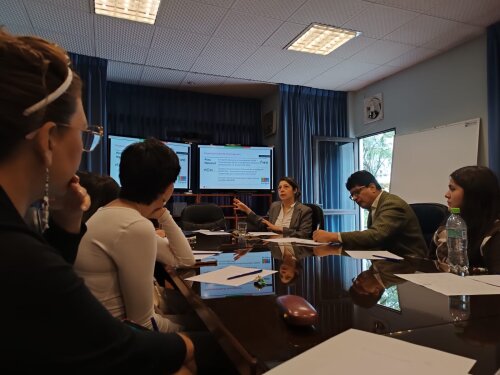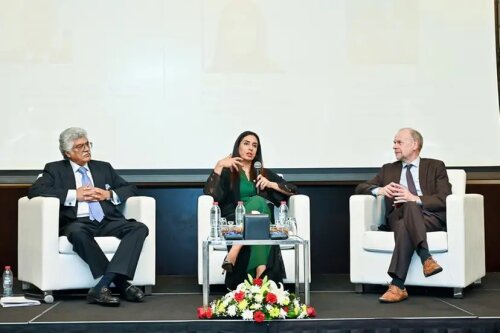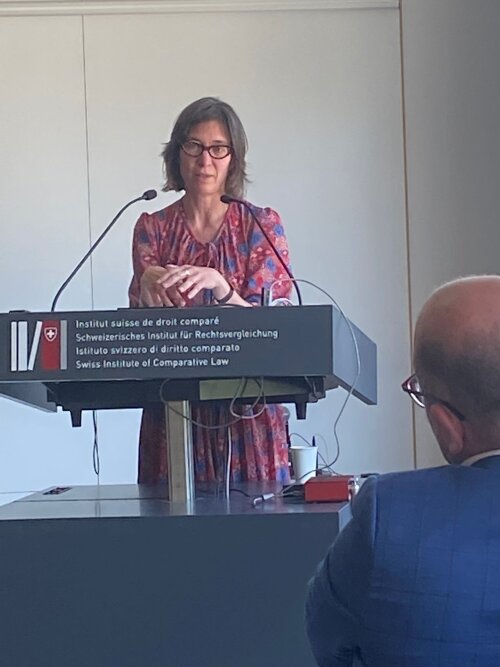The Law and Development Research Group around the world
The researchers of the Law and Development Research Group are constantly engaging in collaborative research activities around the world. Here are some highlights:
Gamze Erdem Türkelli was in the United Kingdom in January 2024 for meetings of the international Climate Finance for Equitable Transitions (CliFT) project in which she participates. CliFT is a subproject the under the auspices of the broader New Frontiers in International Development Finance (NeF DeF) project, led by Prof. Dr. Celine Tan of Warwick University. She also acted as an external examiner for a doctoral dissertation on marine heritage and indigenous peoples’ rights in the context of development projects at the University of Nottingham School of Law.
From 5 to 10 February 2024, she visited Bolivia in the context of a VLIR-UOS funded Inter-University Cooperation Project with Universidad Catholica Boliviana. In Bolivia, she first visited UCB-Cochabamba where she was welcomed by Rector Ruth Riskowski. She presented on the mission and educational and research activities of the Law and Development Research Group to UCB-Cochabamba staff and students working in the areas of human rights law and development. She also shared insights about various venues to finance research, including various competitive funding options in Flanders and Europe to undertake collaborative international research. She then visited UCB-La Paz to meet with Bolivian colleagues leading the IUC project and its subprojects and to share insights for the upcoming period of the project implementation.

Koen De Feyter acted as an external examiner in a panel assessing a PhD proposal on whether strategic state assets can be used as collateral for debt at our privileged partner, the Centre for Human Rights at the University of Pretoria (South Africa); delivered a guest of honour speech at the inaugural session of the two day E- International Seminar on “Disability Rights and Law & Laws Related to Women and Children” organised by Law Mantra Trust in collaboration with Centre for Studies related to Persons with Disabilities, Himachal Pradesh National Law University, Shimla (India) and presented on the UN Guiding Principles on Business and Human Rights at the meeting of the Kimberley Process Civil Society Coalition held in Yaoundé (Cameroon) (photo). All three interventions were made from home.
In February 2024 he was invited by the Permanent Committee for Human Rights of the UAE to present at events dedicated to the right to development. See photograph together with Hind Alowais, Director of the Permanent Committee and Ambassador Zamir Akram, Chairperson of the UN Working Group on the Right to Development.

In June 2023 Thalia Kruger was the examiner of a PhD on Intercountry Adoption in Nigeria at the University of Dundee in Scotland. During that stay, she served as the external member of the selection committee for the University of Dundee’s Africa Doctoral Fellowship Scheme.
Thalia Kruger participated in a seminar on Personal Identity and Status Continuity: A focus on Names and Gender in the Conflict of Laws, organised by the Swiss Institute of Comparative Law in Lausanne (in June 2023), where she was in charge of the keynote closing address.
In October 2023 Thalia Kruger presented a paper at the University of Coimbra’s seminar on Transatlantic Dialogues on Private International Law: Family and Personal Status on the Move. Her paper covered Family and Personal Status and the Best Interests of the Child. She showed how the references to the best interests of the child is not always consistent and its application in law not always testamount to taking the rights of children seriously. The seminar was attended by academics and practitioners from various countries.
These ideas also fed into the introductory panel of the Children’s Rights Seminar that Thalia co-organised with Wouter Vandenhole, Gamze Erdem Türkelli and Kata Dozsa of the Law & Development Research Group in Antwerp in December 2023.
Thalia Kruger presented findings on the position of adults that have appointed a representative or are in need of protective measures across borders in a panel in Aberdeen in October 2023. From there, she moved on to London for a seminar on the consequences of international child abduction, also linked to migration issues and the participation rights of the child.
In December 2023 the Research Group Law & Development organised an event with the Philippine Embassy concerning the award of the Arbitral Tribunal in the South China Sea Arbitration (The Republic of the Philippines v. The People’s Republic of China), with Koen De Feyter on the panel.

In the context of the three-year Biodiversa+ research project on “Environmental Policy Instruments Across Commodity Chains” (EPICC), Tomaso Ferrando realized a short research and teaching stay in Colombia, Bolivia and Brazil as three key agri-food partners of the European Union. The main goals have been the establishment of a space of dialogue around the EU Regulation on Deforestation-free products, the discussion of the main features of this recent piece of EU trade legislation, and the generation of a better and deeper understanding of the multiple ways in which the Regulation is already shaping and will be shaping socio-ecological dynamics in the territories of production.
With the support of partners from UniAndes, Universidad Catolica de Bolivia and the Universidade de São Paulo, a workshop and a series of lectures have been organised, during which academics, representatives of civil society organizations and students from the three countries have shared their perspective and concerns regarding the Regulation, highlighting some key points that will be further investigated in the coming months:
· The non-homogenous nature of agri-food territories, and the risks of adopting a governance mechanism that is not concerned with the distributive implications;
· The risk that the measure, and in particular the temporal benchmark that only gives relevance to the deforestation occurred after the 31 December 2021, would be used to marginalize or silence anti-deforestation protests and resistance that tackle events occurred before that date;
· The possibility that the Regulation, and in particular the ‘legality requirement’, will be adopted by public authorities and private corporations in a non-nuanced way, thus ignoring legal pluralism, the frictions that exist behind land cadastres and the tensions that characterize some of the national legal frameworks around access to land and land registration;
· The fact that in contexts where local environmental demands and revindications are ignored, the Regulation may provide communities and peasants with a new opportunity to obtain the respect of environmental law, in particular regarding the protection of forests;
· The role that the Regulation plays in normalizing the global agri-food system as the sole legitimate way of imagining the future, therefore dismissing the multiple calls for regional food systems, food sovereignty and a move away from food as a global commodity.
Further reflections on the interactions and on the role of the EU Regulation as a source of global governance for agri-food chains will be published on the EPICC website in the form of blogs and podcasts.
Wouter Vandenhole gave a lecture on Human Rights-Based Approaches to Development at the Advanced Human Rights Course on the Right to Development in Africa (2-7 October 2023) co-organized by the Centre for Human Rights at the University of Pretoria and the University of Antwerp.
On 16 November 2023, Wouter Vandenhole presented European Perspectives on the Future of Intercountry Adoption at an Intercountry Adoption Trends panel discussion, organised by the U.S. Department of State.
At the International Conference ‘The Universal Declaration of Human Rights at 75: Rethinking and Constructing its Future Together’ from 6 to 8 December 2023 (Ghent), Wouter Vandenhole chaired a panel on Governing public goods through multistakeholder partnerships: human rights accountability and beyond, and participated in a Roundtable on Accountability and Human Rights: The Many Definitions and Dimensions.
From 28 to 31 January 2024, Wouter Vandenhole attended an editorial meeting in Bristol, UK, in preparation of a Routledge Companion on Critical Children’s Rights Studies. Co-editors are Valeria Llobet (, Afua Twum-Danso (Bristol) and Didier Reynaert (HoGent). Vandenhole also participated in a panel debate on critical children’s rights.
On 9 February 2024, Wouter Vandenhole was the opponent at a PhD defence at Abo Akademi University. The PhD was entitled From Charity to Legal Accountability? A Study on Extraterritorial Human Rights Accountability within Bilateral Development Cooperation.